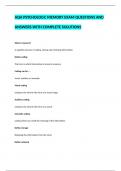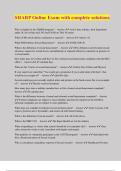Exam (elaborations)
AQA PSYCHOLOGY, MEMORY EXAM QUESTIONS AND ANSWERS WITH COMPLETE SOLUTIONS
- Course
- Institution
AQA PSYCHOLOGY, MEMORY EXAM QUESTIONS AND ANSWERS WITH COMPLETE SOLUTIONS What is memory? A cognitive process of coding, storing and retrieving information. Define coding The form in which information is stored in memory. Coding can be..... visual, auditory or semantic Visual coding codin...
[Show more]




